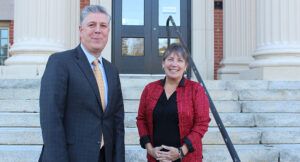President’s Letter

President Maloney and Sen. Anne Gobi ’86. Photo by Nancy Sheehan
Dear Alumni and Friends,
The Worcester State University community recently marked the passing of my predecessor, Worcester State’s first and only female president, Janelle Ashley, Ph.D., who served from 2002 to 2011. As we reflect on her many important contributions to the university, I am reminded that not so long ago women faced significant barriers in education, especially at the collegiate level.
Worcester’s own Sen. Harriette Chandler, Ph.D., who received an honorary doctorate of public administration from Worcester State in 1988, and retired in January 2023, is another woman of the same era who broke ground in education. She graduated from college and attained advanced degrees at a time when men earned doctoral degrees at a rate roughly three times that of women.
Since those pioneering years, women have steadily advanced in higher education, and around 12 years ago, began outpacing men in U.S. doctoral programs. Today, they represent the majority of those enrolled in law school since 2016. I am privileged to work every day with a number of women who are advanced degree holders, from the four who sit on my executive cabinet, to our Dean of Science, Technology, and Health Linda Larrivee, Ph.D., to the hundreds of faculty who have taught thousands of Worcester State University students.

Sen. Harriette Chandler, Ph.D. Photo by Matt Wright ’10
Massachusetts also is a beneficiary. From the many law school-educated senators and representatives, like Worcester State alumna and chair of the Higher Education Committee, Sen. Anne Gobi ’86, to our first-ever elected female governor, Maura Healey, both of whom attended law school when women were underrepresented.
In Gov. Healey’s election campaign, she credited her years on basketball courts for her team approach. Fifty years ago, federal civil rights legislation Title IX outlawed gender discrimination in any school that accepts federal funding (virtually every college and high school). Without this law, Healey may not have had that athletic experience. Among those who’ve benefited from Title IX are my daughter Carden, now a collegiate field hockey coach, and Worcester State’s Vice President for Student Affairs, Julie Kazarian ’98, MA ’01, a Worcester State Hall of Fame track and field star, who won the Worcester City Championship in hammer all four years she competed (1995–1998).
Women have been gaining ground in classrooms ever since passage of those 20th-century laws and court rulings extending their equal rights in educational settings. With educational advancement comes career advancement, and higher education is stronger today as women have become equal partners in educational leadership and in the halls of political power. As Healey shatters the last political glass ceiling in Massachusetts, I have no doubt that remaining ones—notably those in boardrooms and C-suites—will also soon crumble.
Sincerely,
Barry M. Maloney
PRESIDENT


